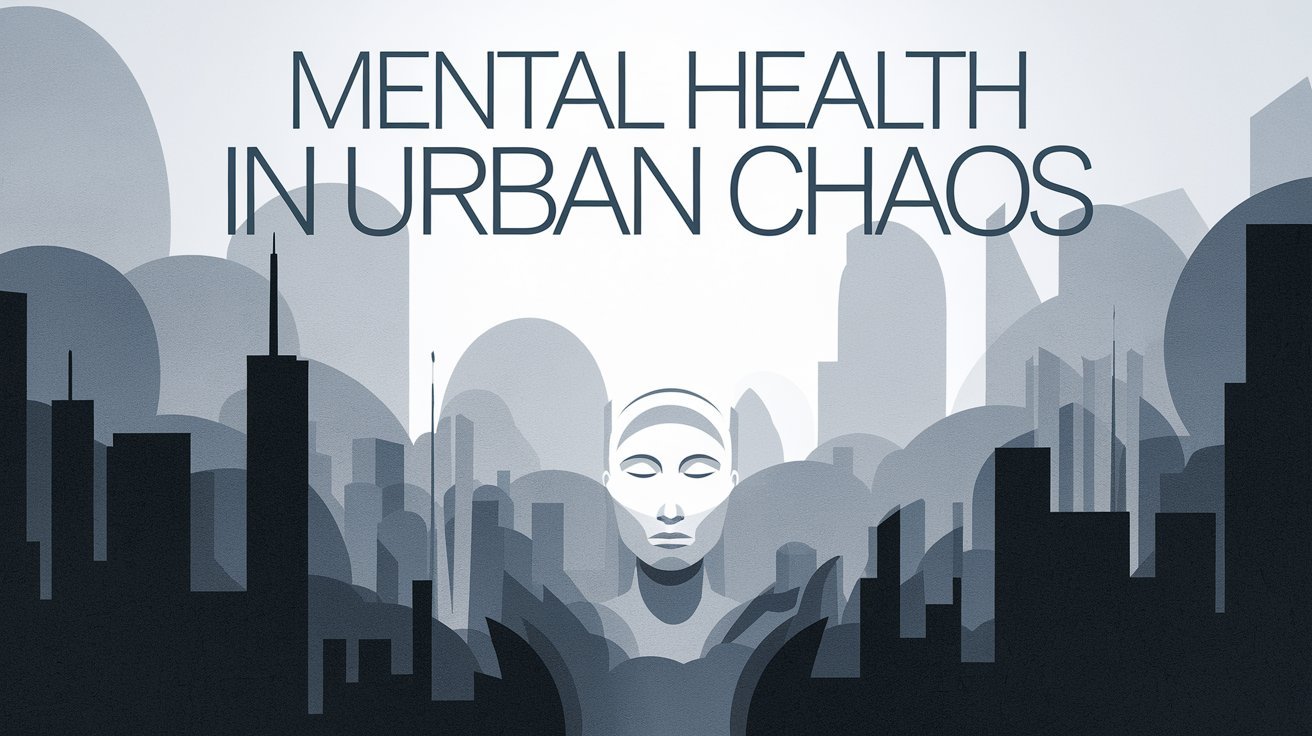Composed By- Ketan Goriwale.
Mental Health In Urban Chaos.
Mental health is a sense of being well as a response to the daily physical and mental activities of people. The human race has led us towards the evolution of everything that we use or have invented. Urbanization is an outcome of growth and has given rise to different issues in urban areas. The issues are related to health and social problems in which mental health is affecting more people. Urbanization carries a unique set of merits but at the same time health challenges.
The city of glass and steel, with roaring noises everywhere, is also very fast-paced. This causes even the stress-relieving people to intervene. The stressors together with urban environments and the architecture attract a lot of people and seek for something even in the chaos. Resilience and focus on the positive and what’s beneficial is what is in order here.
Such circadian rhythms together with the overwhelming competition of the daily rush find the body and the mind even in a brutal state. WHO claims approximately 50% of the world population lives in the city areas. And with the rapidly changing and developing cities, the amount of people having depression or anxiety only rises over time. Panicky and clumsy emotions caused on a daily from the random moments the city holds makes it hard and exhausting to focus on oneself or on their personal mental health.
Turning to self knives, there are other means which can be effective and could probably help balance the two. For once self-awareness is important. Understanding one’s history, feelings, emotions, and how they might be impacted will assist them in coping more effectively. Mindfulness activities such as meditation and yoga relax the brain, help one to alleviate stress, and improve attention. And, workout, be it a walk, a run, or gym sessions produced endorphins to make you feel good and full of life.
Urban mental health is significantly influenced by social relationships. Developing social bonds with family members, friends, and others helps to gain emotional support, minimize the growth of the feelings of loneliness, and the need for belongingness is met. Social networks can be strengthened and positive exchanges stimulated by joining clubs, volunteering, or engaging in group activities.
Mental health may also be influenced by some aspects of urban design and planning. Green areas and gardens break the monotony of concrete cities and serve as places for rest and recreation. Healthcare facilities, outreach programs, and mental health services are effective in providing help whenever needed.
Urban stress and pressures are often attributed to the advancement of technology, but in this case technology itself can be used for the good of one’s mental health. Mobile applications, internet websites, and virtual meetings provide the most seamless access to resources, therapy, and communities.
There is a strong indication that urban people expect mental illness and depressive symptoms more likely than rural, mainly because of the cultural factors resulting from the fast pace of life. The physical and social environments of urban life can contribute both positively and negatively to mental health and well-being. Cities are associated with higher rates of most mental health problems compared to rural areas, with an almost 40% higher risk of depression, over 20% more anxiety, and double the risk of schizophrenia, in addition to more loneliness, isolation, and stress.
The current COVID-19 pandemic has created a global health emergency. Its economic and social impacts have spread over varied aspects of life. People of different age groups are experiencing these effects in various ways.
The gradual shift of working mode from an offline working environment to online work from home is the main key factor for arising psychological issues. The Spread of coronavirus has resulted in a lack of physical interaction as well as public gatherings, which is an important activity in lifestyle. Outdoor sports, hanging out with friends, most importantly not being in isolation is a part of the lifestyle in youngsters. It helps in developing interests in various skills and critical thinking. Good mental health can improve enjoyment, skills, and educational achievements.
The current COVID-19 pandemic has certainly created important challenges for us. Eating disorders, suicidal thoughts, and substance abuse are challenges among youngsters. The causes of the increase in tension and psychological instability are unemployment, no income, isolation, lack of conversation, and most important death of family members.
The pandemic has contributed to diminished productivity in youth due to stress associated with their work. Tension, anxiety, isolation, and insecurity are the symptoms of mental illness. These problems affect the urban population where mental instability is a typical phenomenon as a result of mental ill-being. Good mental health reduces depression reduces stress improves functioning of the body and improves mood and reduces aggression.
Even before the Covid-19 crisis, youngsters had suffered from mental health and according to UNICEF south Asia had the highest numbers of mental disorders associated with it.
The long-term impacts in behavior are also reflected in youth, resulting in a lack of physical activities because of a gradual shift from offline to online working conditions. Sleeping conditions and cardiovascular health have also been affected while living in the city and that could be a feeder to conditions of mental health.
“The COVID-19 pandemic has created the largest disruption of education systems in history, affecting nearly 1.6 billion learners in more than 190 countries”
-World Health Organization, 2020
Education is a fundamental right for everyone. The effects of the pandemic related to institution closures and learning has become severe for most young fellows who are attending colleges. It is going to affect their educational year which is again going to create a chaotic situation because of loss in teacher-to-student interaction. This online learning situation has become difficult for students who have become familiar to teachers’ presence.
Online learning has many drawbacks, but at the same time, it has offered several benefits for students who want flexibility while attending college. The good part of it was a slight number of students made good use of time in terms of more learning opportunities and availability of wide-reaching access to online research and study material.
Apart from the current pandemic situation, other factors associated with life are an integral part of giving rise to it ex. social environment, school, and behavioral change. Etc. Even before the crisis, the social and economic integration of young people was a challenge, now unless action is taken young people are going to suffer its impacts. They are concerned about the future and place within it. Even if several difficulties were being faced by young people, they also have found different ways to face new challenges and cope with their emotions.
One of the great solutions for addressing mental health issues could be seeking the support of someone who guides us through tough times and the second is not to ask for help for mental issues without being afraid of anyone. The person could be anyone from your childhood friend to family or teachers.
It is practically challenging to design research that can demonstrate causative relationships between urban design and mental health. Therefore, most of the research in this field focuses on identifying associations. There is a need to spread awareness about mental illnesses across all sections of society. This will serve as a facilitator of change in a fast-transforming Indian society.
There is a need for planning according to NLM (National Library of Medicine), longitudinal and developmental studies, and implanting evidence-based elaborative plan of action to cater to psycho-social and mental health needs during the pandemic as well as post-pandemic. Also, access to mental health support services towards providing measures for developing healthy coping mechanisms.




